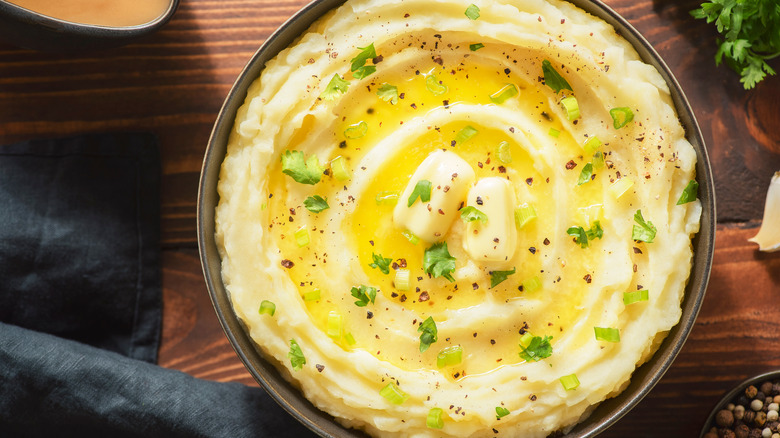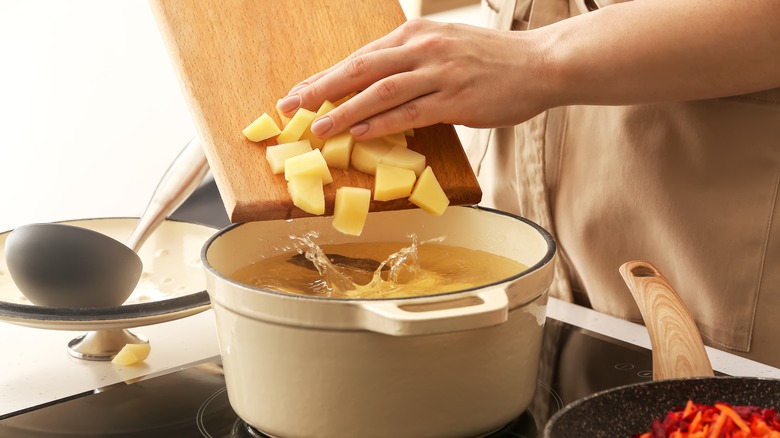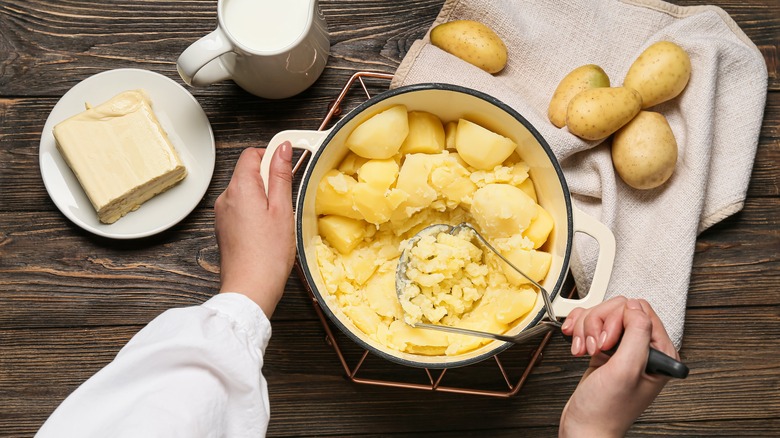Don't Make The Mistake Of Cutting Your Spuds Too Small For Mashed Potatoes
When making mashed potatoes, chopping the potatoes into small pieces lets you boil them for less time, but don't get carried away. Cutting the potatoes too small allows them to absorb too much water. The consequence is a watery, mushy mash. Chopping your potatoes into smaller pieces increases the surface area of the potato in contact with the boiling water, allowing them to absorb water more quickly. At the same time, because each potato piece has less volume, it takes less time to cook, and they will become soft more quickly.
If you boil chopped potatoes for a long time, eventually they will soften completely and break down into the water, creating a starchy potato liquid. Essentially, chopping your potatoes into very small pieces makes it easier to overcook them and end up halfway to a watery potato mush. If this happens, your potatoes have absorbed way too much water. Not only will they have a watery texture and diluted taste, but when it comes to combining your potatoes with dairy to create a rich mash, they won't be able to absorb as much, so the flavor is even weaker. So, what is the ideal size to chop your potatoes when making mashed potatoes? It depends on how much time you have to make your mash and what type of potatoes you're using.
How to avoid watery mashed potatoes
There are plenty of mistakes to avoid when making mashed potatoes, and quite a few of these can lead to your mash becoming watery and bland. However, with a little knowledge, it's easy enough to prevent this from happening. Firstly, as a rule of thumb, it's generally best to cut your potatoes into pieces 1½ to 2 inches wide. If you're in no rush, you can even boil them whole. When you can push your fork into the center of one of them easily without it sticking, they're ready for draining and mashing. If you're worried about leaving your potatoes boiling for too long, you can follow timings instead. Boil chopped potatoes for about 15 minutes before checking with a fork, or for whole skin-on potatoes, check them after 30 minutes.
Choosing the right potatoes is another important factor when making mash. Not all potatoes are equal: The starch content of a potato is the key element for making a good mash; this binds the fat molecules in your dairy to your mash, helping you get that perfect fluffy yet silky texture and rich, comforting flavor. The best starchy potatoes to use for mashed potatoes will vary depending on what's available in your location. In the U.S., high starch varieties of potatoes include russet, Idaho, and Yukon Gold. However, in the U.K., for example, Maris Piper and King Edward potatoes are starchy and commonly used for mash.
How to correct watery mashed potatoes
If you've chopped your potatoes too small or you boil them for too long, don't despair. You have some options to get them to thicken up and taste just right. If your potatoes are runny, it's likely because too much starch has been lost (or too much water absorbed) during boiling, so you'll need to add extra starch. You can do this by mixing some cornflour or another starch with a tiny amount of cold milk or water, then adding it bit by bit to your mash until you reach the desired consistency. One starch you may wish to avoid, however, is standard wheat flour, as this will require toasting in a pan first to remove the floury taste before you can add it to your mash. The best option for adding extra starch is to stick to the same carbohydrate: potato. If you have the time, simply boil some additional potatoes and add these to your mash — just be careful not to cook them too long again — adding more watery potatoes to an already watery mash won't help anyone!
Now you're equipped with plenty of tips to ensure you end up with perfect-texture mashed potatoes you can concentrate on boosting the flavor. One secret mash ingredient worth trying to boost its flavor is chicken stock — boil your potatoes in a blend of chicken stock and water, and your mashed potatoes will have added savory deliciousness.


